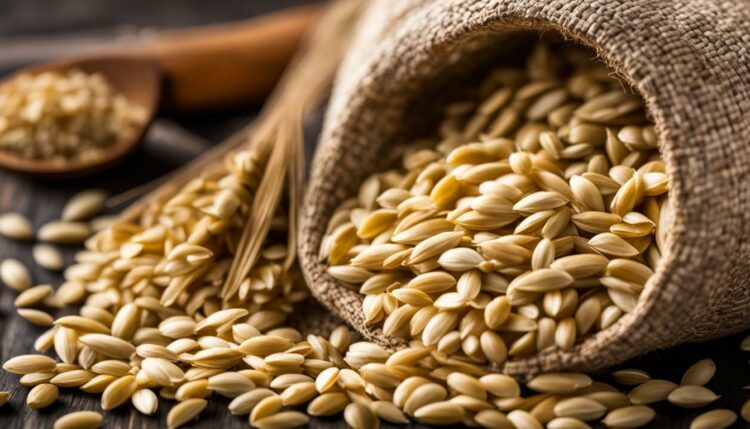Barley, a nutrient-rich grain, offers a multitude of health benefits that can contribute to your overall wellness. Packed with vitamins, minerals, and antioxidants, barley is a versatile ingredient that can support various aspects of your health, including weight management and heart health.
When it comes to weight loss, barley shines as a high-fiber grain that promotes digestion, reduces hunger, and aids in weight loss efforts. Its soluble fiber content, such as beta-glucan, not only helps you feel fuller for longer but also supports a healthy heart by lowering cholesterol levels.
Key Takeaways:
- Barley is a nutrient-rich grain that offers various health benefits.
- It is high in fiber, promoting healthy digestion and aiding in weight loss.
- Barley contains beta-glucan, which helps lower cholesterol levels and supports heart health.
Barley for Digestive Health
When it comes to maintaining a healthy digestive system, barley can be a valuable addition to your diet. Packed with fiber, barley offers a range of benefits for digestive health, including regular bowel movements and prevention of constipation.
One of the unique qualities of barley is its high content of both soluble and insoluble fiber. Insoluble fiber adds bulk to the stool, helping to promote regular bowel movements and prevent constipation.
On the other hand, soluble fiber feeds beneficial gut bacteria and reduces inflammation in the digestive tract, which can aid in overall digestion.
Furthermore, barley water, a soothing beverage made from barley grains, has been known for its digestive benefits. It can help manage conditions like irritable bowel syndrome (IBS), providing relief from symptoms such as abdominal pain, bloating, and irregular bowel movements.
The Soothing Power of Barley Water
Barley water has long been recognized for its soothing effect on the digestive system. By reducing inflammation and irritation in the gastrointestinal tract, it can help alleviate digestive discomfort and promote overall digestive health.
Barley water can help manage conditions like irritable bowel syndrome (IBS), providing relief from symptoms such as abdominal pain, bloating, and irregular bowel movements.
In addition to its calming properties, barley water can also play a significant role in managing diabetes. It has a low glycemic index, meaning it doesn’t cause a sudden spike in blood sugar levels. This makes it a suitable beverage for individuals with diabetes, as it helps regulate blood sugar levels and prevent potential complications.
Barley and Diabetes Management
Research has shown that incorporating barley into one’s diet can be beneficial for managing diabetes.
The soluble fiber in barley slows down digestion and the absorption of carbohydrates, which helps prevent blood sugar spikes after meals. This can have a positive impact on glucose control and contribute to overall diabetes management.
Barley’s low glycemic index helps regulate blood sugar levels, making it suitable for individuals with diabetes.
Moreover, the beneficial gut bacteria that thrive on the soluble fiber in barley can also help regulate blood sugar levels. These bacteria produce short-chain fatty acids that can improve insulin sensitivity and enhance glucose metabolism.
In summary, barley’s high fiber content and its soothing and regulating properties make it an excellent option for promoting digestive health and managing conditions like irritable bowel syndrome and diabetes.
- Barley promotes regular bowel movements and prevents constipation.
- Barley water has a soothing effect on the digestive system and can help manage irritable bowel syndrome (IBS).
- Barley’s low glycemic index and soluble fiber content make it a suitable food for individuals with diabetes, aiding in blood sugar regulation.
Barley for Cholesterol Control
Barley has proven to be an effective grain for controlling cholesterol levels. Its unique composition and nutritional profile make it a valuable addition to a heart-healthy diet.
The beta-glucans found in barley play a significant role in cholesterol control. These soluble fibers bind to bile acids in the digestive system, which are necessary for digestion but are also made from cholesterol.
Barley’s beta-glucans promote the excretion of bile acids, which in turn forces the liver to use more cholesterol to produce new bile acids. This process helps to lower LDL (“bad”) cholesterol levels and reduce the risk of heart disease.
In addition to beta-glucans, barley contains antioxidants called lignans. These compounds further contribute to cholesterol control and overall heart health. Antioxidants help protect the body against harmful free radicals, which can lead to inflammation and damage to the arteries.
By incorporating barley into your diet, you can benefit from these powerful antioxidants that support cardiovascular health.
Benefits of Barley for Cholesterol Control:
- Reduces LDL (“bad”) cholesterol levels
- Promotes the excretion of bile acids
- Forces the liver to use more cholesterol
- Lowers the risk of heart disease
- Contains antioxidants that support cardiovascular health
With its cholesterol-lowering properties and rich antioxidant content, barley offers a natural and effective solution for maintaining healthy cholesterol levels and protecting your heart.

Remember to consult with your healthcare provider before making any significant changes to your diet or incorporating barley for specific health conditions.
Barley and Cancer Prevention
Barley, a nutritious grain, offers more than just its delightful taste and satisfying texture. It is also packed with antioxidants, such as lignans, that have been linked to a reduced risk of cancer.
Antioxidants play a crucial role in neutralizing harmful free radicals in the body. These unstable molecules can damage cells and potentially lead to the development of cancer. By incorporating barley into your diet, you can benefit from its powerful antioxidants that help protect against these damaging effects.
But that’s not all. Barley’s high fiber content also contributes to cancer prevention. Fiber plays a significant role in promoting healthy digestion, preventing constipation, and reducing the buildup of toxins in the colon.

While more research is needed to fully understand the extent of barley’s potential in cancer prevention, there is promising evidence that it can be a valuable addition to a balanced diet.
Barley for Bone Health
When it comes to maintaining strong and healthy bones, barley can play a crucial role. This nutrient-rich grain contains essential minerals like calcium, phosphorus, magnesium, and manganese that are vital for the structure, growth, and maintenance of bones.
Calcium is well-known for its importance in bone health, as it helps build and strengthen bones. Phosphorus works alongside calcium to support the formation of bone tissue and maintain bone density. Magnesium contributes to bone strength by enhancing the absorption and utilization of calcium in the body.
Furthermore, barley is a natural source of manganese, which plays a role in the production of collagen, a protein that provides strength and flexibility to bones. Adequate intake of manganese helps facilitate the mineralization process, ensuring that bones are able to properly absorb and utilize essential nutrients.
In addition to these essential minerals, barley contains selenium, an antioxidant that protects against inflammation. Chronic inflammation is known to contribute to various health conditions, including bone-related diseases like osteoporosis. By incorporating barley into your diet, you can help reduce inflammation and promote optimal bone health.
Overall, the nutrient profile of barley makes it a valuable addition to a bone-healthy diet. Its wealth of essential minerals, coupled with the protective effects of selenium, can support the strength, structure, and longevity of your bones.
By embracing the benefits of barley, you can take proactive steps towards reducing the risk of bone-related diseases and ensuring the wellness of your skeletal system.
Conclusion
Barley is a true powerhouse when it comes to nutrition and wellness benefits. This versatile grain is loaded with fiber, vitamins, minerals, and antioxidants that play a key role in supporting overall health. Whether you’re looking to shed some pounds, boost heart health, improve digestion, prevent cancer, or promote strong bones, barley has got you covered.
One of the remarkable features of barley is its high fiber content, which aids in weight loss by promoting satiety and regulating digestion. Moreover, the beta-glucans in barley help to lower cholesterol levels, reducing the risk of heart disease.
Its goodness doesn’t stop there – barley is also known for its positive impact on digestion, soothing the digestive system and managing conditions like irritable bowel syndrome (IBS).
With its abundance of antioxidants such as lignans, barley offers potential cancer-fighting properties by neutralizing free radicals and supporting healthy digestion. Additionally, barley’s impressive mineral profile, containing calcium, phosphorus, magnesium, and manganese, contributes to strong bones and reduces the risk of bone-related diseases.
As you can see, incorporating barley into your meals is a simple yet effective way to boost your nutrition and enhance your overall wellness. So, why wait? Start harnessing the benefits of this extraordinary grain today and experience the positive impact it can have on your health.
FAQ
What are the health benefits of barley?
Barley offers numerous health benefits due to its nutrient-rich profile. It is packed with vitamins, minerals, and antioxidants, making it a valuable addition to any diet.
Is barley beneficial for weight loss?
Yes, barley is beneficial for weight loss. It is high in fiber, which promotes digestion, reduces hunger, and aids in weight loss.
How does barley benefit heart health?
Barley supports heart health by containing nutrients like beta-glucan that help lower cholesterol levels, reduce the risk of heart disease, and improve overall heart health.
What are the benefits of barley water?
Barley water is known for its soothing effect on the digestive system. It can help manage conditions like irritable bowel syndrome (IBS) and aid in diabetes management by regulating blood sugar levels.
How does barley help with cholesterol control?
Barley contains beta-glucans, which bind to bile acids made from cholesterol. This promotes the excretion of bile acids and forces the liver to use more cholesterol to produce new bile acids. As a result, barley helps lower LDL (“bad”) cholesterol levels and reduces the risk of heart disease.
Can barley help prevent cancer?
Barley contains antioxidants like lignans, which have been linked to a reduced risk of cancer. These antioxidants neutralize harmful free radicals in the body and promote healthy digestion, contributing to cancer prevention.
How does barley contribute to bone health?
Barley is rich in essential minerals like calcium, phosphorus, magnesium, and manganese, which are crucial for maintaining strong and healthy bones. These minerals aid in bone structure, growth, and maintenance, reducing the risk of bone-related diseases.




